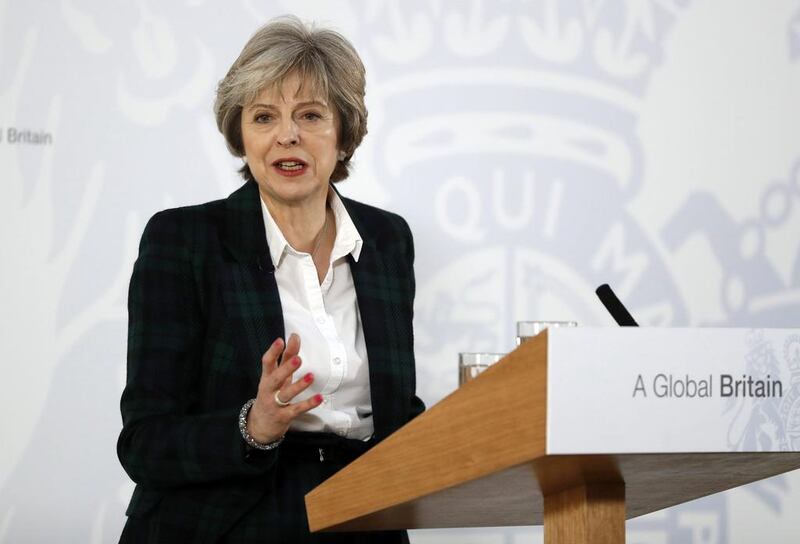The UK plans to make a clean and complete break from the European Union, even as it aspires to remain “profoundly internationalist”, prime minister Theresa May said in a much-anticipated speech in London on Tuesday.
As she laid down her ambition for a “hard Brexit”, however, Mrs May warned the EU not to be punitive in its negotiations over the UK’s exit. “That would be an act of calamitous self-harm for the countries of Europe. And it would not be the act of a friend.”
For months, Mrs May has had to counter accusations that she and her ministers have no well-defined vision for Brexit. The speech on Tuesday, delivered at Lancaster House, was intended to allay those fears and uncertainty.
In the immediate wake of the speech, the British pound experienced its steepest surge since the Brexit referendum last June, rising to $1.23 to the pound. But the currency is still worth roughly 17 per cent less than it was before the referendum.
Since June, speculation has swirled over whether the UK would try to opt for a “soft Brexit” – which would involve retaining some form of membership in the European single market.
According to government estimates, a hard Brexit will cost the British economy £66 billion (Dh298.5bn) a year, and the country’s gross domestic product could fall by as much as 9.5 per cent.
But Mrs May was adamant in her government’s preferred course of action: a hard Brexit.
“The United Kingdom is leaving the European Union,” she said. “Not partial membership of the European Union, associate membership of the European Union, or anything that leaves us half-in, half-out. We do not seek to adopt a model already enjoyed by other countries. We do not seek to hold on to bits of membership as we leave.”
The prime minister did, however, say her negotiators would work to reach some form of free-trade regime between the EU and the UK in an attempt to preserve a modicum of access to the European common market.
The British government is now expected to trigger Article 50 – the clause of the Lisbon Treaty that initiates separation from the EU – by the end of March.
That will be followed by a two-year negotiating period, at the end of which the House of Commons and House of Lords will get to approve or reject the final Brexit deal that Mrs May’s government has hammered out with the bloc.
A rejection of the deal may involve a return to the negotiating table, prolonging the Brexit process.
Among the 12 objectives Mrs May outlined for the negotiations, she said she wished to “guarantee the rights of EU citizens who are already living in Britain” but that her government would work hard to control further immigrants from Europe to the UK.
The UK will also strive to maintain visa-free travel with the Republic of Ireland, a point that earned appreciation from the government in Dublin.
The Irish government welcomed Mrs May’s decision to maintain the common travel area and avoid a return to a hard border with Northern Ireland.
In another veiled warning to the EU, Mrs May emphasised that her government would seek advantageous terms in the divorce.
She cautioned that to alienate the UK during the negotiations “would jeopardise investments in Britain by EU companies worth more than half a trillion pounds”.
“It would mean a loss of access for European firms to the financial services of the city of London. It would risk exports from the EU to Britain worth around £290 billion every year.”
Jeremy Corbyn, the leader of the opposition Labour Party, accused Mrs May of “wanting to have her cake and eat it”.
“She has said ‘Leave the single market’, then at the same time ‘We want access to the single market’. I’m not quite sure how that’s going to go down in Europe,” Mr Corbyn said.
Tim Farron, the leader of the Liberal Democrats, worried Mrs May’s speech was “a mixture of vague fantasies and toothless threats to our nearest neighbours”.
“At the moment Britain needs friends more than ever, she has succeeded in uniting the rest of Europe against her,” he added.
Adam Marshall, the director of the British Chambers of Commerce, said Mrs May’s speech had at least given the UK’s business community a clearer sense of the prime minister’s top-line priorities.
But “they will come away from her speech knowing little more about the likely outcome of the Brexit negotiations than they did yesterday”, he added.
Mr Marshall advised the government to institute a “simple and light-touch system” to govern EU citizens living and working in the UK which does not involve complex and lengthy paperwork and other bureaucratic requirements. Bringing them “into the costly and bureaucratic Home Office work permit process would be a huge regulatory burden”, he warned.
German foreign minister Frank-Walter Steinmeier said Mrs May’s speech “has finally created a little more clarity”, but noted that seven months after the referendum, Brexit has still not been formalised.
“We therefore welcome the fact that the British prime minister has today sketched out her government’s plans for leaving,” Mr Steinmeier said.
ssubramanian@thenational.ae





